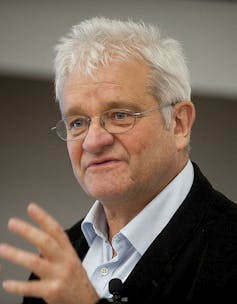Scientists are facing great uncertainty ahead of the UK government’s comprehensive spending review on November 25. Not only is funding for research under threat, the government is believed to be planning on culling many of the agencies that fund research in an effort to make savings.
Now a long-awaited review, led by the Royal Society’s president Paul Nurse, has recommended that a single body is set up to oversee research funding in the country. While such an arrangement could work well, it is crucial that investment in science is protected. Having one body in charge of many funding streams could make it extremely vulnerable.
The question is whether the government will listen. Just as successive governments have been unable to not meddle with the organisation of the NHS, it is clear from a large number of recent reviews that the government is keen on making significant changes to research.
Unusual funding structure
By many international measures, the UK is world-beating in scientific research, and comfortably attracts the highest volume of funding from the European Research Council among all EU countries. This is in spite of a fixed research budget which has been eroded by inflation since 2010.
From the outside, arrangements for allocating research funds to universities in the UK may seem overly complex. Individual researchers bid to one of seven research councils, covering disciplines ranging from arts to engineering and medicine, for funding of specific projects. In parallel, the Higher Education Funding Council for England (HEFCE) – and its counterparts in the rest of the UK – provide institutions with block grants based on the quality of research undertaken, informed by an assessment known as the Research Excellence Framework.
This “dual support” provides universities with a baseline award covering a fraction of academic staff costs. It also allows researchers to recruit graduate students and post-docs for the highest-priority research projects. In most regards this system works exceptionally well, and the respective agencies have a good understanding of what the researchers they fund need.
But civil servants at the Department for Business, Innovation and Skills – responsible for universities and science – are querying whether seven research councils are really necessary. After all, other developed counties seem to operate effectively with just one. Every so often, reforms to the makeup of UK research councils have been made. Still, there has been much-needed continuity, and five research councils were already in existence 50 years ago.
To date, there have been modest attempts to make the research councils work more closely together. In 2002 an umbrella structure, Research Councils UK, was introduced to develop a common strategy for capital infrastructure projects. However, in 2014 a “triennial review” of the research councils came to the conclusion that there was no compelling case to reduce the number of councils. Could it be that the government has chosen to keep reviewing until it gets the answer it wants to hear?
Single body

The new single organisation proposed in the review, Research UK, would have overall responsibility for allocating funds and reporting to BIS. However, Nurse also stresses that the existing research councils should retain their autonomy within this new structure. The business secretary, Sajid Javid, however, was most likely hoping the review would recommend a bigger shake-up.
Hopefully, having the current research councils within a single organisation, akin to seven faculties in a university, would give them greater influence. There are worries that recent capital investments in science by the government have been directed towards its own “pet projects” rather than long-term strategic investments in infrastructure needed to keep current facilities running.
But there are some thorny issues which remain unanswered. In parallel with the new review, BIS recently published its Higher Education green paper in which the body responsible for awarding teaching grants to English universities would be switched from HEFCE to a new Office for Students. HEFCE will likely be culled, so which organisation would be responsible for the allocation of block research grants to English universities?
Nurse suggests Research UK could do so, provided the dual-support system remains in place and the current expertise of HEFCE is retained. Still, there are concerns that if all university research funds were administered by a single body, a squeeze on its budget would have a dramatic impact on financial planning in English universities.
Perhaps the most challenging aspect of Nurse’s report involves how to improve the interaction between scientists and government departments beyond BIS. He proposes introducing a ministerial committee, chaired by a senior minister with cross-cutting cabinet responsibilities. This committee would also include other ministers with major science budgets, and would be advised by Research UK and the government’s chief scientific adviser.
Regardless of how research funding is administered, next week we’ll find out whether chancellor George Osborne has been persuaded to maintain – or even increase – the science budget ring fence over the next four years. Osborne has spoken of his desire for Britain to become the best place to do science, so let’s hope that he is true to his word on November 25.

